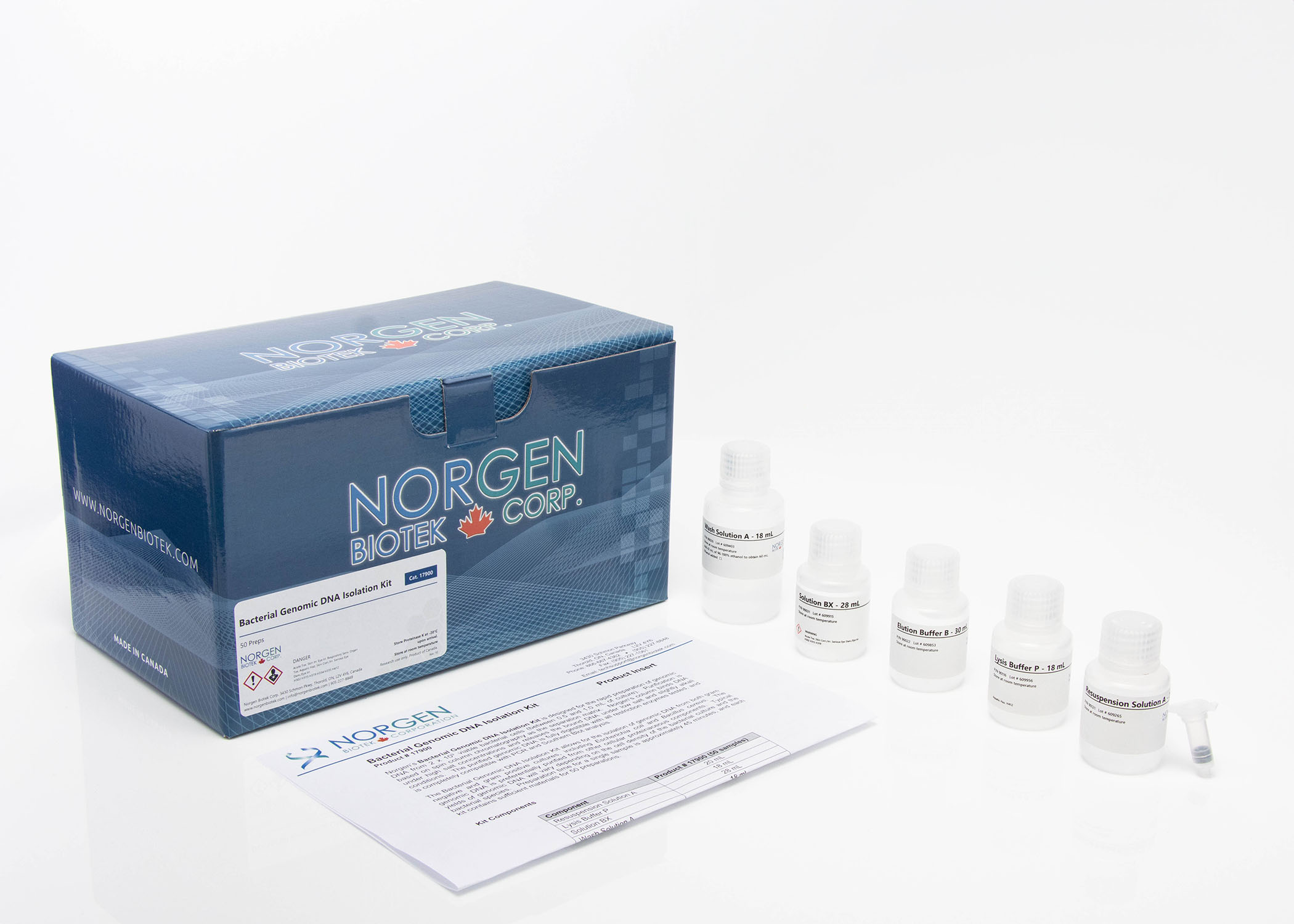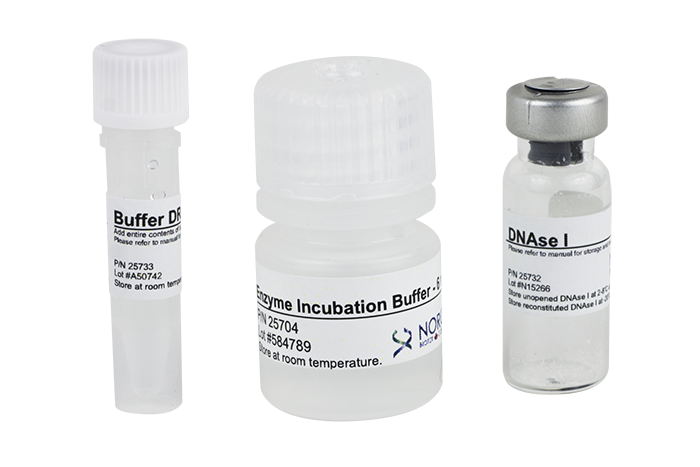Phage DNA Isolation Kit
For the rapid purification of total DNA from bacteriophages.



For research use only and NOT intended for in vitro diagnostics.
Phage DNA Isolation Kit
For the rapid purification of total DNA from bacteriophages.
Register today to receive an exclusive 15% off* on your first order.
Features and Benefits
- Isolate high quality DNA from a broad variety of phage strains
- High yields of total DNA
- Fast and easy processing using a rapid spin-column format
- No phenol or chloroform extractions or cesium chloride banding required
- High yields of DNA recovered 3-15 µg DNA from 108-1010 pfu/ mL of enriched phages
This kit provides a rapid spin column method for the purification of total DNA from a broad spectrum of bacteriophages propagated in bacteria grown in liquid cultures. The DNA is isolated without the use of phenol, chloroform or cesium chloride banding procedures. The spin-column based procedure is rapid and can be completed in less than 45 minutes. The kit is highly efficient for processing small volumes of phage supernatant (500 µL – 1 mL) and with the optional DNase and Proteinase K treatments phage DNA yields are maximized while host DNA contamination is minimized. Purified total phage DNA is of the highest integrity, and can be used in a number of downstream applications including PCR, qPCR, Restriction Fragment Length Polymorphism (RFLP), sequencing, cloning, Southern Blot and more.
Details
Supporting Data
Figure 1. Effective Host Genomic DNA Removal without Reducing Phage DNA Yield. Total DNA was isolated from four enriched phage cultures using Norgen's Phage DNA Isolation Kit. A DNase I pre-treatment was performed prior to adding the provided Lysis Buffer. Briefly, 20 units of DNase I was added to 1 mL of enriched phage culture and the mixture was incubated at room temperature for 20 minutes. After the DNAase I treatment the procedure was followed. As a control, DNA was isolated from aliquots of the same 4 cultures using Norgen’s Phage DNA Isolation Kit without performing the DNase I treatment. For DNA analysis 10 µL of each 50 µL elution was loaded onto a 1X TAE agarose gel. As it can be seen, the phage DNA was safely protected from the DNase I treatment by its coat protein, while the host genomic DNA was efficiently degraded by the DNase I. Thus the DNase I pre-treatment resulted in less host gDNA contamination in the final phage elution without influencing the total phage DNA yield. Lane M is Norgen's Highranger 1 kb DNA Ladder (Cat. 11900)
Figure 2. Optional Proteinase K Treatment Improves DNA Yield for Certain Phage Strains. Total DNA was isolated with and without the optional Proteinase K treatment using Norgen's Phage DNA Isolation Kit. Briefly, 4 µL of Proteinase K (20 mg/mL) was added to 1 mL of enriched phage culture and incubated at 55°C for 15 minutes with the phage Lysis Buffer. After the Proteinase K treatment the procedure was followed. As a control, DNA was isolated from aliquots of the same 8 cultures using Norgen's Phage DNA Isolation Kit without performing the Proteinase K treatment. For DNA analysis 10 µL of each 50 µL elution was loaded onto a 1X TAE agarose gel and the yield of DNA was compared from the eight different phage types (lane 1 to 8). As it can be seen, the optional treatment of Proteinase K improved the phage DNA yield in Lanes 2, 5 and 6 dramatically. Lane M is Norgen's Highranger 1 kb DNA Ladder (Cat. 11900)
|
Kit Specifications
|
|
|
Column Binding Capacity
|
50 µg
|
|
Maximum Column Loading Volume
|
650 µL
|
|
Size of DNA Purified
|
All sizes
|
| Maximum Amount of Starting Material |
1 x 1010 pfu/mL enriched phages
|
| Average Yield* |
3-15 µg DNA from 108-1010 pfu/mL
of enriched phages |
| Time to Complete 10 Purifications |
45 minutes
|
* Average yields will vary depending upon a number conditions used and developmental stage.
Storage Conditions and Product Stability
All solutions should be kept tightly sealed and stored at room temperature. This kit is stable for 1 year after the date of shipment.
| Component | Cat. 46800 (50 preps) | Cat. 46850 (100 preps) |
|---|---|---|
| Lysis Buffer B | 40 mL | 2 x 40 mL |
| Wash Solution A | 38 mL | 2 x 38 mL |
| Elution Buffer B | 8 mL | 2 x 8 mL |
| Spin Columns | 50 | 100 |
| Collection Tubes | 50 | 100 |
| Elution Tubes (1.7 mL) | 50 | 100 |
| Product Insert | 1 | 1 |
Documentation
FAQs
Spin Column
Column clogging may occur due to one or more of the following reasons:
- Centrifugation speed was too low or spin time was inadequate.
Check the centrifuge to ensure that it is capable of generating the required RPMs. Sufficient centrifugal force is required to move the liquid through the resin. Also, ensure that the correct spin times are followed. Spin for an additional minute if necessary.
- Bacterial debris in the lysate.
Ensure that the starting material is clarified phage supernatant. Remove bacterial debris from the initial phage supernatant by centrifugation at 10,000 × g for 5 minutes before beginning the protocol.
- The lysate/binding solution mixture is not homogeneous.
To ensure a homogeneous solution, vortex for 10-15 seconds before applying the lysate to the spin column.
- Centrifuge temperature is too low.
Ensure that the centrifuge remains at room temperature throughout the procedure. Temperatures below 20℃ may cause precipitates to form that can cause the columns to clog.
The yield of genomic DNA may be lower than expected due to the following:
- Ineffective propagation of phage and initial lysis step.
Refer to the manufacturer's recommendations for the propagation of the phage, including proper titer for inoculation, growth conditions, and bacterial host.
- Incomplete lysis of cells.
Ensure that the incubation was performed for 15 minutes at 65℃ after the addition of Lysis Buffer B. Also, perform optional digestion with Proteinase K in Step 1b during Lysate Preparation.
- Ethanol was not added to the Wash Solution A.
Ensure that 90 mL of 96 - 100% ethanol is added to the supplied Wash Solution A prior to use.
- The DNA elution is incomplete.
Ensure that all the DNA is eluted. If elution buffer remains in the column, use 14,000 g for the second centrifuge.
If the DNA does not perform well in downstream applications, it may be due to one or more of the following:
- DNA was not washed three times with the provided Wash Solution A.
Traces of salt from the binding step may remain in the sample if the column is not washed three times with the Wash Solution A. Salt may interfere with downstream applications and thus must be washed from the column.
- Ethanol carryover.
Ensure that the dry spin under the Column Wash procedure is performed in order to remove traces of ethanol prior to elution. Ethanol is known to interfere with many downstream applications.
Host genomic DNA can contaminate the phage DNA. In order to eliminate host genomic DNA contamination in the phage DNA elution, it is recommended that a DNase I treatment is performed at the beginning of the lysate preparation procedure (see Section 1, Optional DNase Treatment).
Yes, the kit can isolate both ssDNA and dsDNA phage genomes.
Citations
| Title | Perturbation and resilience of the gut microbiome up to 3 months after ß-lactams exposure in healthy volunteers suggest an important role of microbial ß-lactamases |
| Citation | Microbiome 2024. |
| Authors | Camille d'Humières, Margot Delavy, Laurie Alla, Farid Ichou, Emilie Gauliard, Amine Ghozlane, Florence Levenez, Nathalie Galleron, Benoit Quinquis, Nicolas Pons, Jimmy Mullaert, Antoine Bridier-Nahmias, Bénédicte Condamine, Marie Touchon, Dominique Rainteau, Antonin Lamazière, Philippe Lesnik, Maharajah Ponnaiah, Marie Lhomme, Natacha Sertour, Savannah Devente, Jean-Denis Docquier, Marie-Elisabeth Bougnoux, Olivier Tenaillon, Mélanie Magnan, Etienne Ruppé, Nathalie Grall, Xavier Duval, Dusko Ehrlich, France Mentré, Erick Denamur, Eduardo P. C. Rocha, Emmanuelle Le Chatelier & Charles Burdet |
| Title | Phage Paride can kill dormant, antibiotic-tolerant cells of Pseudomonas aeruginosa by direct lytic replication |
| Citation | Nature Communications 2024. |
| Authors | Enea Maffei, Anne-Kathrin Woischnig, Marco R. Burkolter, Dorentina Humolli, Nicole Thürkauf, Thomas Bock, Alexander Schmidt, Pablo Manfredi, Adrian Egli, Nina Khanna, Urs Jenal & Alexander Harms |
| Title | Protocol for phage matching, treatment, and monitoring for compassionate bacteriophage use in non-resolving infections |
| Citation | STAR Protocols 2024. |
| Authors | Hadil Onallah 1 2 3 6, Ortal Yerushalmy 2 4 6, Ron Braunstein 2 4, Sivan Alkalay-Oren 2 4, Amit Rimon 2 4 5, Daniel Gelman 2 4 5, Shunit Coppenhagen-Glazer 2 4, Ronen Hazan 2 4 7, Ran Nir-Paz 1 2 3 8 |
| Title | Seed coating with phages for sustainable plant biocontrol of plant pathogens 2 and influence of the seed coat mucilage |
| Citation | Prepriint BIORXIV 2024. |
| Authors | Sebastian H. Erdrich 1,2, Ulrich Schurr 1 , Julia Frunzke 2* and Borjana Arsova 1 |
| Title | The Citizen Phage Library: Rapid Isolation of Phages for the Treatment of Antibiotic Resistant Infections in the UK |
| Citation | microorganisms 2024. |
| Authors | by Julie Fletcher 1,*ORCID,Robyn Manley 1ORCID,Christian Fitch 1ORCID,Christina Bugert 1,Karen Moore 1ORCID,Audrey Farbos 1,Michelle Michelsen 1,Shayma Alathari 1ORCID,Nicola Senior 1ORCID,Alice Mills 2,Natalie Whitehead 2ORCID,James Soothill 3,Stephen Michell 1ORCID and Ben Temperton |
| Title | Tradeoffs Between Evolved Phage Resistance and Antibiotic Susceptibility in a Highly Drug-Resistant Cystic Fibrosis-Derived Pseudomonas aeruginosa Strain |
| Citation | Phage 2024. |
| Authors | Kaylee Wilburn, Cole B. Matrishin, Anika Choudhury, Ray Larsen, and Hans Wildschutte |
| Title | Genome sequence of Arthrobacter globiformis phage MaGuCo |
| Citation | Microbiology Resource Announcements 2024. |
| Authors | Amanda E. Diggins https://orcid.org/0009-0007-2070-7475, Mary G. Gubitose, Elijah G. Hinrichsen, Patrick T. Jones, Brian S. Kearns, Caitlynn E. Lord, Mary T. Parsons, Rachel A. Pitt, Isabella A. Woods, Teagan R. Zarakotas, Beth M. Wilkes |
| Title | Isolation of Streptococcus mutans temperate bacteriophage with broad killing activity to S. mutans clinical isolates |
| Citation | Iscience 2023. |
| Authors | Katsuhito Sugai, Miki KawadaMatsuo, Mi Nguyen-Tra Le, ..., Kotaro Tanimoto, Motoyuki Sugai, Hitoshi Komatsuzawa |
| Title | Isolation and genome sequencing of five lytic bacteriophages from hospital wastewater in the Philippines |
| Citation | Bacteriophages 2023. |
| Authors | Michael Angelou L. Nada https://orcid.org/0000-0002-3466-3465 mikeangelounada@gmail.com, Joseph B. Ancla, Nikka Mae R. Yadao, Virgilio P. de Paz, Jr., Jessica G. Manalaysay, Fred Lawrence D. Samante, Ursela G. Bigol |
| Title | Isolation and in vitro characterization of novel S. epidermidis phages for therapeutic applications |
| Citation | Frontiers in Cellular and Infection Microbiology 2023. |
| Authors | Vida Štrancar, Monika Marušic, Jasmina Tušar, Neža Pracek, Marko Kolenc, Katja Šuster, Simon Horvat, Nika Janež and Matjaž Peterka |





